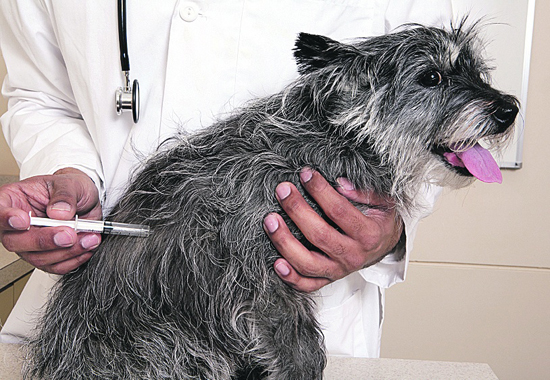 | | | istockphoto
| | | | | | Today is World Rabies Day - September 28, 2011 - a day to increase awareness about the public health problem of rabies infection throughout the world. Each year, about 55,000 people die from rabies disease, mostly in Asia and Africa. An important global source is dog bites in these areas and children are especially at risk.
 Rabies virus enters the nerves of the victim from a bite wound or saliva, and ends up infecting brain tissue. The average time between bite and brain penetration is 20-30 days. Once the virus reaches the brain, symptoms occur such as change in behavior, change in voice, larynx (voice box) spasms, and weakness of muscles. Drooling is considered the "classic" sign and is a result of the larynx becoming paralyzed. Once signs appear, there is no standard treatment for animals. (It is important to note that many other problems can cause drooling, however!)
Rabies virus enters the nerves of the victim from a bite wound or saliva, and ends up infecting brain tissue. The average time between bite and brain penetration is 20-30 days. Once the virus reaches the brain, symptoms occur such as change in behavior, change in voice, larynx (voice box) spasms, and weakness of muscles. Drooling is considered the "classic" sign and is a result of the larynx becoming paralyzed. Once signs appear, there is no standard treatment for animals. (It is important to note that many other problems can cause drooling, however!)
 California is an endemic area for rabies virus, as are most of the other states. In fact, only Hawaii does not have rabies present. There have been only 15 human cases in California since 1980, according to the California Department of Public Health, August 2011. In 2010, 175 cases of rabies found in animals were confirmed. The most common carriers are bats and skunks. Other animals included dogs (two cases), coyote and fox (five combined), cattle (one case). Two bats were found in Contra Costa County. Almost every part of the state was affected, with multiple counties reporting a low incidence.
California is an endemic area for rabies virus, as are most of the other states. In fact, only Hawaii does not have rabies present. There have been only 15 human cases in California since 1980, according to the California Department of Public Health, August 2011. In 2010, 175 cases of rabies found in animals were confirmed. The most common carriers are bats and skunks. Other animals included dogs (two cases), coyote and fox (five combined), cattle (one case). Two bats were found in Contra Costa County. Almost every part of the state was affected, with multiple counties reporting a low incidence.
 Part of the mission of World Rabies Day is to spread the word that rabies is 100% preventable. All dogs and cats in California can be vaccinated at four months old. Keeping your pet current on his/her rabies vaccine not only provides a high-level of protection against rabies disease, but also provides "insurance" against a euthanasia mandate by the County if your pet is bitten by a suspect rabid animal. If a wild animal bites you, promptly wash the wound thoroughly with soap and contact your physician. If a wild animal bites your pet, do not try to handle the wild animal, but contact Animal Control for advice. It is best to avoid contact with unfamiliar domestic animals and wild animals, especially the known common carriers such as bats, skunks and foxes.
Part of the mission of World Rabies Day is to spread the word that rabies is 100% preventable. All dogs and cats in California can be vaccinated at four months old. Keeping your pet current on his/her rabies vaccine not only provides a high-level of protection against rabies disease, but also provides "insurance" against a euthanasia mandate by the County if your pet is bitten by a suspect rabid animal. If a wild animal bites you, promptly wash the wound thoroughly with soap and contact your physician. If a wild animal bites your pet, do not try to handle the wild animal, but contact Animal Control for advice. It is best to avoid contact with unfamiliar domestic animals and wild animals, especially the known common carriers such as bats, skunks and foxes.
 Further information can be acquired through websites such as www.cdph.ca.gov/ , www.veterinarypartner.com , and www.worldrabiesday.org.
Further information can be acquired through websites such as www.cdph.ca.gov/ , www.veterinarypartner.com , and www.worldrabiesday.org.

|

